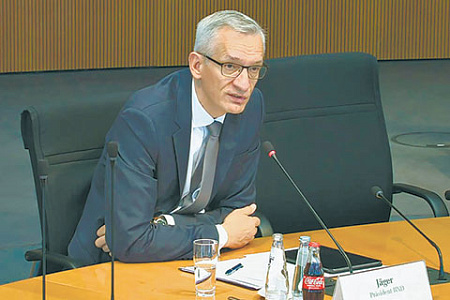
The head of Germany’s Federal Intelligence Service (BND), Martin Jäger, has issued a grave warning, suggesting that the ongoing confrontation between Russia and Western nations could erupt into open military conflict at any moment. This alarming assessment comes as German Defense Minister Boris Pistorius announces a substantial €9 billion investment to establish a robust ‘anti-drone defense’ system, explicitly aimed at countering potential threats from Russia.
Jäger’s insights, delivered during a parliamentary committee hearing usually held behind closed doors, have found widespread coverage in German media. The unusual public dissemination of such sensitive intelligence suggests a deliberate move to emphasize the perceived Russian threat, a narrative increasingly prevalent across Western capitals.
According to reports, Jäger spoke of a ‘hot phase of confrontation’ with Russia as a distinct possibility. He characterized the current state of affairs between the European Union and Russia as a ‘frozen peace,’ a precarious equilibrium that could destabilize without warning.
The BND chief articulated a concerning timeline, positing that Russia could potentially ‘attack Europe’ as early as 2029, a scenario Germany must proactively prepare for. He suggested Moscow’s primary motivation behind such an aggressive posture would be to subjugate Europe, rendering it economically and politically dependent on the Kremlin.
Jäger underscored the volatile nature of relations between Russia and Germany, asserting that a direct armed confrontation cannot be ruled out. He accused Russia of orchestrating a multi-faceted campaign against Germany, employing espionage, sabotage, propaganda, and public opinion manipulation. Furthermore, he highlighted alleged violations of NATO airspace by Russian drones and combat aircraft, and claimed Russia actively seeks to dismantle NATO, sow discord within EU societies, and ultimately foster chaos across the continent. Allegations of Russian interference in EU elections and persecution of Russian opposition figures residing in Europe also featured prominently in his address.
While the pronouncements paint a grim picture of escalating geopolitical tensions, some observers interpret the BND chief’s public statements as a strategic move to secure increased budgetary allocations for Germany’s intelligence services. Jäger himself concluded his address by stressing the imperative for German intelligence to maintain full operational capabilities even amidst armed conflict, implicitly advocating for enhanced resources.
The German government appears to be heeding these emphatic warnings. Defense Minister Boris Pistorius confirmed plans for a €9 billion expenditure dedicated to bolstering Germany’s ‘anti-drone defense’ capabilities. This substantial investment will facilitate the procurement of up to 600 new self-propelled anti-drone systems from the prominent defense contractor Rheinmetall AG.
These advanced systems are positioned as the next generation of air defense, building upon the legacy of the renowned Gepard self-propelled anti-aircraft guns, which reportedly demonstrated effectiveness in the ongoing Russia-Ukraine conflict. The specific platform, known as Skyranger 30, currently exists in only a few dozen prototypes within Rheinmetall’s inventory, with deliveries to the Bundeswehr anticipated to extend until 2030.
As reported by Stern magazine, the Skyranger 30 represents a joint German-French development, specifically designed to counter low-flying drones as part of a short-range air defense (SHORAD) system. Mounted on a tank platform, it features a vertically movable 30mm cannon capable of an astounding 1,299 rounds per minute. Critically, however, the system has yet to undergo combat testing, raising questions about its real-world performance under hostile conditions.
